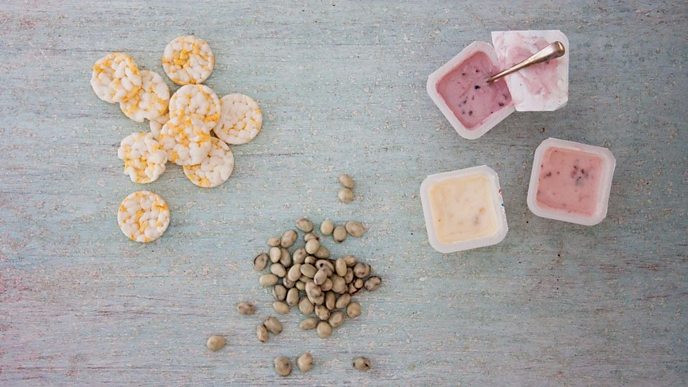Healthy Diet Foods Making You Fat

Are These Healthy Diet Foods Making You Fat?
It seems like every week there are more and more “healthy” diet foods on the market. From protein shakes to granola bars, there’s no shortage of sugar-free, diet or low-fat alternatives for you to munch on.
But are these healthy diet foods really helping you lose weight? Or could they secretly be the cause of your stubborn body fat that just won’t shift?
The Problem With Diet Foods
The problem with diets foods is that they can lure you into a false sense of security. A low-fat doesn’t mean it’s low calorie or that you'll lose weight. No-added-sugar doesn’t mean it hasn’t got sugar in it. Following this way doesn’t mean you won’t gain weight.
In today’s blog post RT Aesthetics are going to expose some of the worst culprits. The foods often marketed as 'healthy' diet foods that could in actual fact be making you fatter!
The benefits of low-fat processed foods have been questioned, as many replace the fat with added sugar or sweeteners. Not all calories are thought of as the same any more, with experts identifying that fat and protein have advantages over refined carbohydrates in making you feel satiated and full for longer.
The 'Low-Fat' Trap
Studies show that we eat more when something is described as ‘low-fat’. In one study people ate as many as 28 percent more low-fat sugar-coated chocolates than normal ones. It also found that people underestimate the number of calories they consume when eating low-fat food.
Know that guilty feeling when you’ve eaten a lot of something high-calorie, high-sugar and/or high-fat? You’re not alone. But when you eat too much of a food labelled ‘low-fat’, studies show you feel less guilty, especially if you’re overweight already. Labelling snacks as 'low-fat' seems to mean people increase the serving size regardless of whether the snack is healthy or unhealthy.
A food labelled ‘low-fat’, in which the fat has been replaced with sugar, may not be as low in calorie density as you'd expect. Meringues, for example, are no-fat but very high in sugar. A diet high in ‘good’ fat is likely to be better for you than a low-fat diet that is high in sugar.
Some Of The Worst 'Healthy' Diet Foods
Granola and Cereal Bars
One of the most commonly mistaken healthy diet foods are granola bars and cereal breakfast bars. Yes, they are full of nuts, seeds and oats that can help you stay fuller for longer. However they are also full of sugar too, in fact they could be as much as 50% sugar! The average granola bar has between 12-16g of sugar in each bar, that’s 3-4 teaspoons!
Quaker Oat So Simple Morning Bars have only around 6g, but that’s still more than a teaspoon of sugar so you might want to start thinking of your granola or breakfast bars as more of a treat, rather than a healthy snack.
Dried Fruit
Dried fruit is another food often mistakenly put in the healthy diet foods category. Yes, fruit is good for you in small doses, it is packed with vitamins, minerals and other beneficial things like antioxidants. When you eat it as nature intended then the sugar content is no big deal thanks to the fibre that slows digestion.
However, dried fruit has been processed (change it) to allow it to stay on the shelves for longer. A handful of dried raisins contains around 6 teaspoons of sugar. Here are some more dry fruits:
- Dried apricots (15g)
- Dried raisins (25g)
- Dried figs (35g)
- Dried apples (10g)
Flavoured Yoghurts
Marketed as a healthy way to start the day, some yoghurts have fantastic health benefits – but you have to choose the type of yoghurt carefully. All yoghurts have some sugars in, this is from the milk (lactose). Live natural yoghurts combine protein and good fats are full of healthy bacteria that promote beneficial gut flora and healthy microbiome.
But many yoghurts on the market, especially flavoured ones, have the healthy fat removed and a lorry load of added sugar to sweeten them up too. The average flavoured yoghurt contains about 17g of sugar, that is around 4 ¼ teaspoons. The worst offenders on the market can have up to 25g – that’s a whopping 6 ¼ teaspoons per teeny, tiny tub.
Now, as I said, some yoghurts can be really good for you. They can contain live bacteria that help keep your gut healthy, in turn improving your immune system and boosting your overall skin, body and general health. But they have to be the right type. Look for live yoghurts, with no added sugar.
Fruit Juice
You should avoid drinking fruit juice. That is all we have to say on this one!
Fruit juice might seem like a great way to get some vitamins into your body, but it really isn’t. As you know, fruit naturally contains some sugars. When eaten as a whole fruit, the absorption of these sugars are slowed down, reducing the amount of sugar in your bloodstream at any one time. Plus whole fruit contains healthy fibre, enzymes, vitamins and minerals.
A glass of orange juice contains around 21g of fast-hitting sugars, and apple juice is even worse at 24g (6 teaspoons).
Low-Fat Foods
Unfortunately low fat foods are NOT healthy. Firstly, fat has been wrongly demonised since the 1950’s which triggered the low-fat movement since the. This has been pivotal in causing the obesity epidemic we are now in.
Your body needs fat to function. When you consume fat the body does not just turn that into fat. Your taste buds primarily crave two different things: fats and sugars. Healthy foods are that tasty and therefore food manufactures remove the fat to make a low-fat food, they often pile in a load of sugar.
Making your low-fat foods one of the least healthy diet foods out there! Common culprits include low-fat cakes, cereals, yoghurts and even low-fat peanut butter.
You can read all about the number 1 diet for weight loss.
Can you consume sweeteners?
Whether it’s diet soda, saccharin instead of sugar in tea, a sugar-free dessert or sweet, or even a ready-meal, artificial sweeteners have been fully adopted into modern diets.
But what if the very things thought to help us eat less sugar and stay slimmer are actually making us fatter? Studies suggest that if you consume something sweet you appetite increases, whether the food or drink is artificially sweetened or not. This is because sweeteners activate the brain's 'sugar reward' pathways, giving you a 'sweet tooth' that can cause you to snack more. When you consume something naturally sweet you have an initial metabolic response to the sugar, but studies show that the initial neuro-physical response to artificial sweeteners is not the same.
Some artificial sweeteners also trigger insulin, which sends your body into fat storage mode and leads to weight gain.






